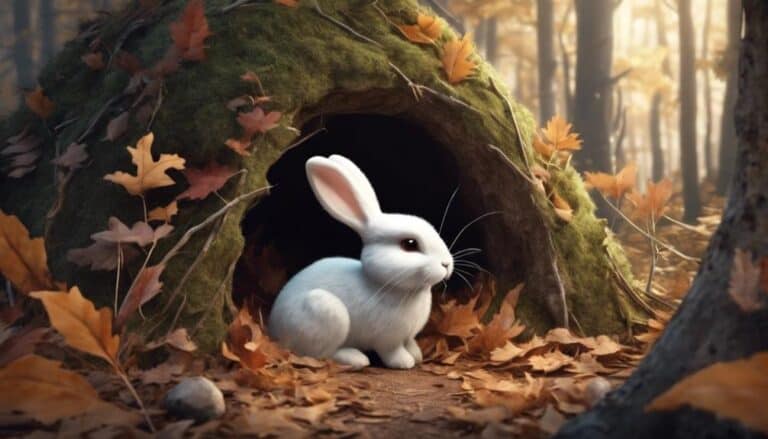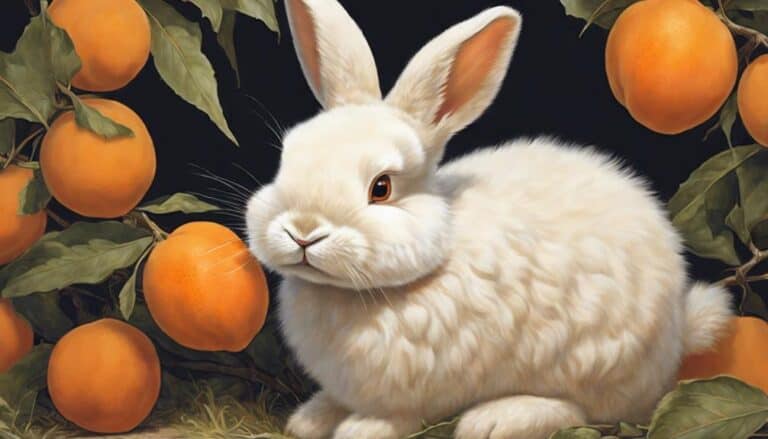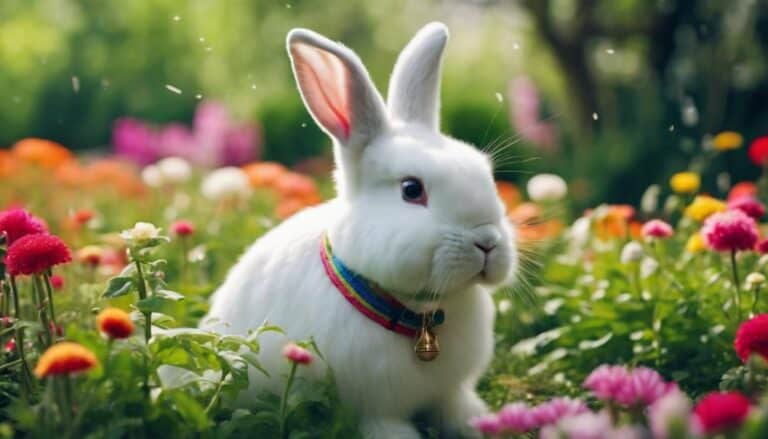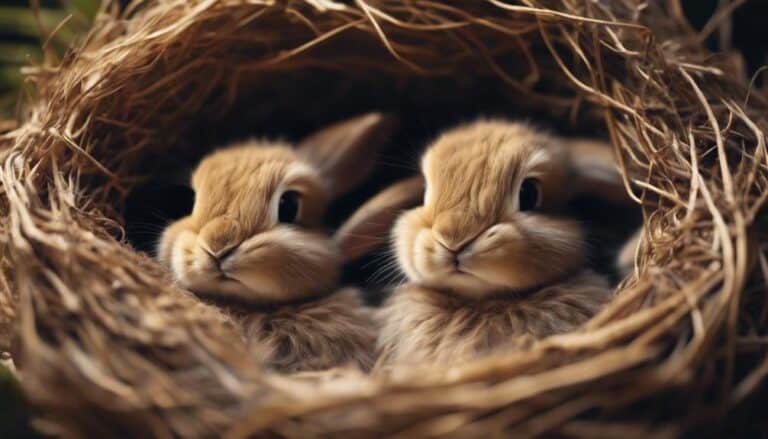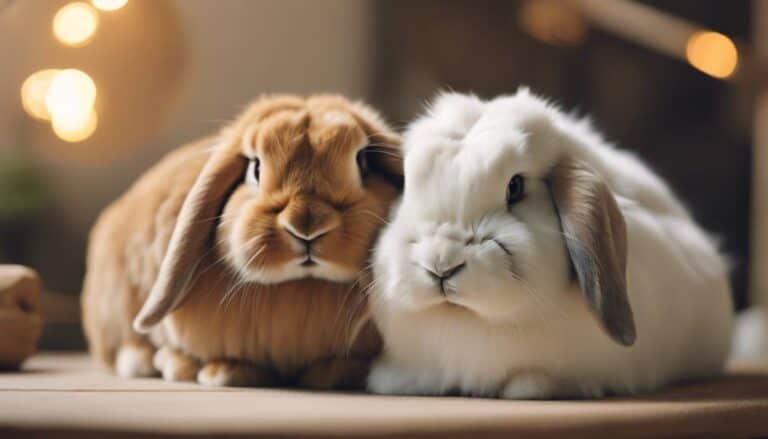When choosing a rabbit breed, it's essential to consider their genetic makeup to ensure your pet's good health. You're probably wondering which breeds are the healthiest and most resilient.
It's not surprising, given that some rabbit breeds are more prone to certain health issues than others.
So, which breeds stand out for their robust health and stamina?
Let's explore the world of the healthiest rabbit breeds and what makes them top contenders in rabbit care.
Contents
Key Takeaways
So, you're wondering what the healthiest rabbit breeds are? Well, let's dive in!
First of all, cross-bred rabbits tend to have a wider gene pool, which can reduce the risk of health issues. That's because they're less likely to inherit specific health problems that can be common in certain breeds.
Some breeds are also known for having low-maintenance coats, which can promote overall health. For example, Rex, Californian, and Dutch rabbits have coats that are easy to care for, which means they're less prone to skin problems and other health issues related to grooming.
But health isn't just about physical characteristics – mental health is important too! Breeds like Harlequin, Dutch, and Polish rabbits are known for being intelligent and engaging, which means they need plenty of mental stimulation to stay happy and healthy.
Of course, no matter what breed you have, regular health checks are vital to ensure your rabbit stays healthy. And don't forget about mental stimulation – rabbits need exercise and playtime to stay happy and engaged!
Finally, if you're short on space, don't worry – some breeds adapt really well to small living spaces. Dutch and Dwarf Hotot rabbits are perfect examples of breeds that can thrive in smaller environments, as long as they get the care and attention they need.
Robust Rabbit Breeds
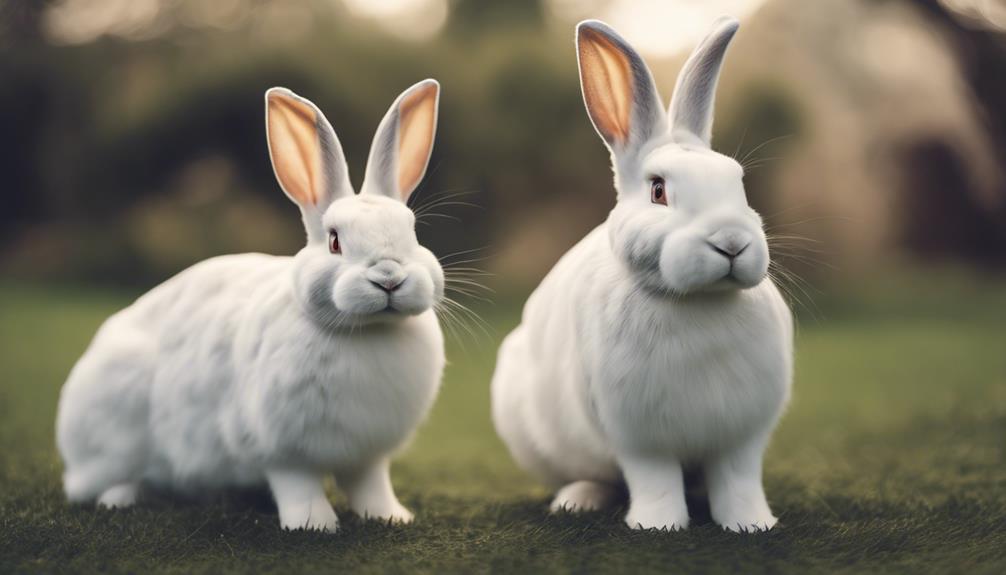
When it comes to robust rabbit breeds, you might want to consider cross-bred rabbits. They tend to have a wider gene pool, which can lead to fewer health issues compared to purebred varieties.
This diverse genetic makeup can result in stronger immunity and overall health, making them less prone to hereditary conditions that are commonly seen in purebred rabbits.
For example, purebred dwarf rabbits like Netherland Dwarfs can often suffer from specific health problems due to their limited gene pool.
On the other hand, cross-bred rabbits combine the characteristics of different rabbit breeds, offering a healthier alternative with reduced risks of genetic disorders.
While purebred rabbits may exhibit certain desirable traits, they're more susceptible to inheritable health issues.
Low-Maintenance Coat Varieties
When it comes to choosing a rabbit breed, a low-maintenance coat can make a big difference. You want a breed with fur that's easy to care for, so you don't have to spend a lot of time grooming them.
Breeds with simple grooming needs are perfect for busy owners or those who just don't want to deal with a lot of fur.
Plus, if you or a family member has allergies, a breed that sheds less can be a huge help.
Easy-Care Fur Types
Some rabbit breeds are perfect for owners who want a low-maintenance pet. These breeds have easy-care fur types that require minimal grooming, saving you time and effort.
Rex rabbits, for instance, have a low-maintenance coat that doesn't need frequent grooming. Californian rabbits have a short, smooth coat that's easy to care for and doesn't require regular grooming. Dutch rabbits have a short coat that's easy to maintain and comes in various colors and patterns. Polish rabbits have a short, dense coat that requires minimal grooming, making them perfect for low-maintenance pet owners.
If you want a rabbit that won't demand too much grooming attention, consider one of these breeds. They offer the joy of pet ownership without the hassle of extensive coat maintenance.
Simple Grooming Needs
If you're looking for a low-maintenance pet, some rabbit breeds are perfect for you. Their short, easy-to-care-for coats require minimal grooming.
Dutch rabbits, for instance, have a coat that's simple to care for. They're ideal for busy individuals who don't have a lot of time to spend on grooming.
The Polish breed is known for the distinctive crest of fur on their head. They've a short and smooth body coat that only needs occasional brushing.
Californian rabbits have a short, dense coat that sheds minimally. They're easy to groom, making them a hassle-free option.
New Zealand rabbits have a short, smooth coat that demands little grooming. They're perfect for novice rabbit owners who are new to caring for pets.
Satin rabbits have a short, glossy sheen coat that's effortlessly maintained with minimal grooming efforts.
Opting for these rabbit breeds with low-maintenance coats can contribute to your pet's overall health and well-being. At the same time, it simplifies your grooming routine.
Minimal Shedding Breeds
If you're looking for rabbit breeds that don't shed much and have low-maintenance coats, you might want to consider the Rex, Californian, Dutch, Polish, and Britannia Petite.
The Rex rabbit's fur is really special – it's super soft and velvety, and it doesn't shed much at all. Plus, it's really easy to take care of, so it's a great choice if you don't want to spend a lot of time grooming your rabbit.
The Californian rabbit has a short, smooth coat that's easy to groom and doesn't shed much. This makes them a popular choice for busy owners who don't have a lot of time to dedicate to rabbit care.
The Dutch rabbit has a short, easy-to-maintain coat that sheds very little and doesn't require much grooming. This makes them a great choice for anyone who wants a low-fuss pet.
The Polish rabbit has a short, smooth coat that doesn't shed much and is easy to care for. This makes them a popular choice for anyone who wants a low-maintenance pet.
These breeds are perfect for people who want a rabbit that doesn't require a lot of grooming and doesn't shed all over the place. They're a great option for anyone who wants a low-maintenance pet.
Intelligent and Curious Breeds
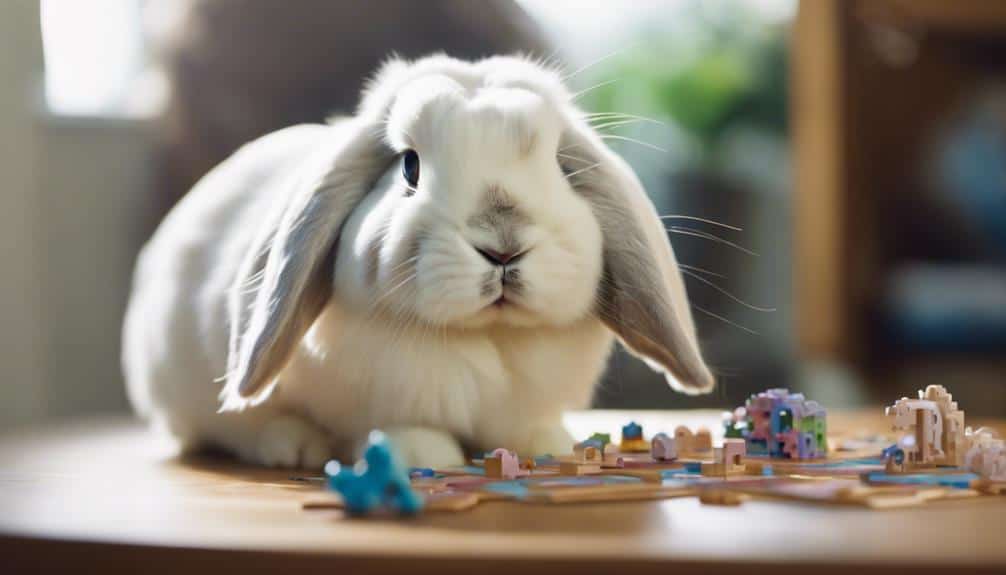
You'll really enjoy the intelligence and curiosity of certain rabbit breeds. They're a blast to hang out with!
The smartest rabbit breeds are quick learners, and you can even train them to do tricks. It's amazing to see them pick up things so fast.
Some bunny breeds are super inquisitive, and that's what makes them so entertaining.
They've got a playful and explorative nature that'll always keep you on your toes. You'll never get bored with these curious critters around!
Smartest Rabbit Breeds
So you're looking for the smartest rabbit breeds out there? Well, you've come to the right place! Some rabbit breeds really stand out when it comes to intelligence and curiosity, making them super engaging companions.
When it comes to the smartest rabbit breeds, you might want to check out Harlequin rabbits, Dutch rabbits, English Angoras, and Polish rabbits. These breeds are known for being able to solve problems, learn quickly, and needing mental stimulation to stay happy and healthy.
Harlequin rabbits are considered one of the most intelligent breeds. They're super curious and can learn really quickly.
Dutch rabbits are also super smart – they're great at solving problems and love interacting with their owners.
English Angoras are highly intelligent and curious, but they need mental stimulation to prevent boredom and destructive behaviors.
And Polish rabbits? They're friendly, curious, and can easily learn tricks and commands.
These breeds don't just make great companions – they also offer a really rewarding experience for rabbit owners who want intelligent and engaging pets.
Inquisitive Bunny Breeds
So you're looking to learn about intelligent and curious rabbit breeds? Well, you'll want to explore those that show a high level of inquisitiveness and cognitive prowess. Lop-eared rabbits, with their adorable drooping ears, are among the breeds that stand out when it comes to curiosity and intelligence. However, it's important to keep in mind that lop-eared rabbits, like the Mini Lop, are prone to ear infections due to their ear shape, which can lead to welfare problems if not addressed quickly. Plus, dental issues are common in lop-eared breeds, which makes proper dental care a must to maintain their well-being.
To help you get a better sense of intelligent and curious bunny breeds, let's take a look at some key characteristics:
| Breed | Intelligence Level | Curiosity Level | Common Health Issues |
|---|---|---|---|
| Mini Lop | High | High | Dental problems |
| Holland Lop | Moderate | Moderate | Ear infections |
| French Lop | High | High | Welfare problems |
| English Lop | Moderate | High | Dental issues |
As you can see, each breed has its unique characteristics. The Mini Lop, for example, is highly intelligent and curious, but it's also prone to dental problems. The Holland Lop, on the other hand, has moderate intelligence and curiosity levels, but it's more susceptible to ear infections. By understanding these characteristics, you can make a more informed decision about which breed is right for you.
Bright Rabbit Breeds
If you're looking for rabbits that are intelligent and curious, you should definitely consider bright breeds like the Harlequin. These rabbits are known for being inquisitive and quick learners, making them a lot of fun to be around.
One thing to keep in mind is that Harlequin rabbits are prone to ear infections because of their lop ears. So, you'll need to regularly check and clean their ears to prevent health issues.
Another potential issue with Harlequin rabbits is dental problems. To avoid this, make sure they've plenty of chew toys and a proper diet that's good for their teeth.
Harlequin rabbits also need plenty of mental stimulation to prevent boredom. You can provide this by giving them puzzle toys and having interactive play sessions with them.
Harlequin rabbits are pretty energetic, so they need plenty of exercise. Make sure they've a spacious enclosure or provide supervised free-roam time so they can get the physical activity they need.
Well-Suited Environment Breeds
Some rabbit breeds are super adaptable to living indoors, handling small spaces with ease and requiring minimal exercise.
Dutch rabbits, also known as Hollands, are perfect for apartments or small spaces. They're calm, don't need much exercise, and are compact in size, making them ideal for city dwellers who want a rabbit companion.
Dwarf Hotot rabbits are another breed that does really well indoors and can adjust to limited living spaces. That's why they're popular among urban rabbit owners.
Polish rabbits are friendly, outgoing, and relatively low-maintenance, which makes them a great option for various living situations, including apartments and small homes.
Californian rabbits are known for their gentle nature and adaptability to households with limited space. They're relatively inactive and don't demand extensive exercise, so they're a great choice for those with restricted space.
English Spot rabbits have a friendly and docile temperament, making them well-suited for living situations with limited space, such as apartments or condos.
Longevity in Flemish Giants
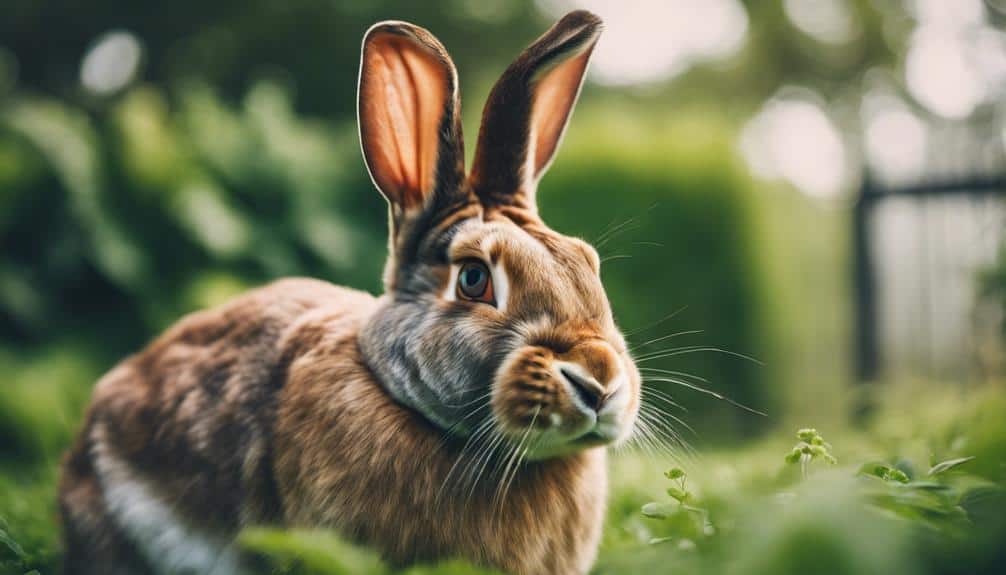
Flemish Giants are known for their impressive size and gentle nature, and they can live for around 7-10 years on average, making them one of the longer-living rabbit breeds.
When it comes to their longevity, it's essential to be aware of potential health problems that can impact their lifespan. For instance, Flemish Giants are prone to issues like arthritis, heart disease, and obesity, which can affect their overall lifespan.
To ensure your Flemish Giant lives a long and healthy life, you'll need to provide regular exercise, a balanced diet, and timely veterinary check-ups. These are vital for their well-being and can help prevent or detect health problems early on.
Considering the potential health challenges your Flemish Giant may face, it's a good idea to invest in pet insurance. This can help cover unexpected medical expenses and give you peace of mind.
Owning a Flemish Giant is a big commitment due to their size, potential health issues, and the need for adequate space and care. So, it's crucial to be proactive in addressing their specific needs and potential health concerns.
Thriving With Exercise and Stimulation
To keep your rabbit in top shape, they need regular exercise and mental stimulation.
Rabbits are naturally agile and fast, so they need at least 2-3 hours of exercise outside their cage every day to stay healthy. This exercise is crucial for their overall well-being and helps them stay physically fit. If you don't provide enough exercise, your rabbit might become obese or develop joint problems.
That's why it's essential to give them plenty of space to move around. A good rule of thumb is to provide at least 8 square feet of floor space per rabbit. This will give them enough room to run around comfortably and engage in physical activities.
But exercise isn't the only thing your rabbit needs. They also need a stimulating environment to prevent boredom and stress. You can achieve this by providing toys, tunnels, and climbing structures.
These will keep your rabbit engaged and entertained, reducing the risk of behavioral problems. Additionally, make sure your rabbit has plenty of hiding places, shelters, and different textures to explore.
This will help reduce their stress levels and keep them mentally stimulated. By following these simple tips, you can ensure your rabbit stays happy and healthy.
Importance of Adequate Care and Space
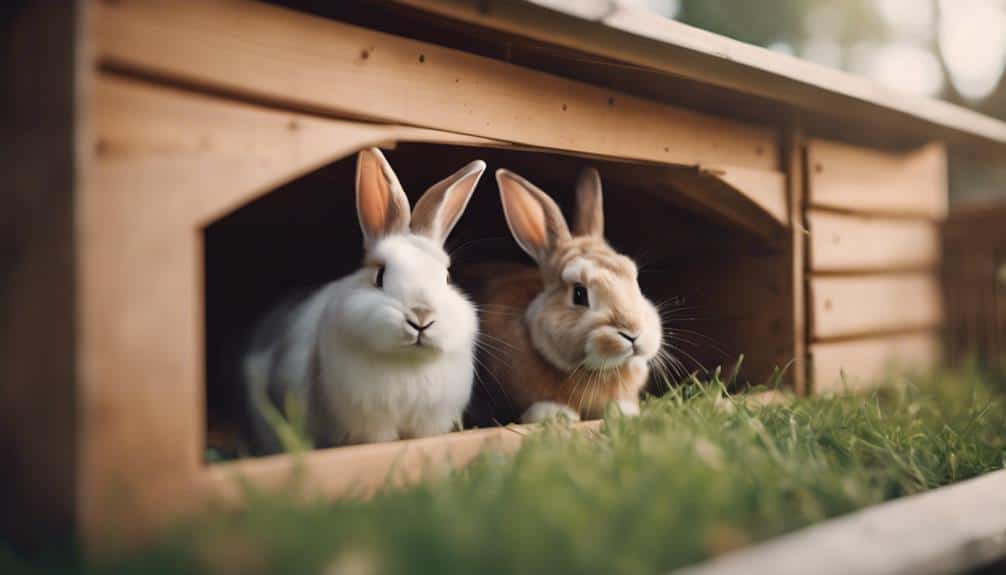
To guarantee the well-being of your rabbit, providing adequate care and space is crucial. Rabbits need room to move around freely and exercise regularly to prevent health problems like obesity and joint issues.
So, what does this mean for you as a rabbit owner? You need to provide sufficient space. Rabbits aren't just happy to stay cooped up in a hutch all day – they need constant access to an exercise area where they can stretch their legs and get some exercise.
Another crucial aspect is their diet. Rabbits thrive on a plant-based diet that's rich in fiber, so make sure they've access to quality feeding hay and fresh grass. This will keep their digestive system in top shape.
Exercise is also vital for rabbits. By creating a stimulating environment with clear boundaries, you can encourage your rabbit to get moving and play. This won't only keep them active but also promote their overall well-being.
Conclusion
So, you're wondering which rabbit breeds are the healthiest?
Well, if you're looking for a robust and low-maintenance pet, consider a Rex, Californian, or Dutch rabbit. These breeds aren't only intelligent and curious, but they also have health benefits and don't require a lot of grooming.
Another breed that's known for its longevity is the Flemish Giant. These rabbits can live a long and healthy life if you provide them with the right environment and care.
This means giving them plenty of space to exercise and stimulating their minds with toys and activities.
Remember, the key to a happy and healthy rabbit is providing the right care and attention. So, do your research and choose a breed that fits your lifestyle.
With the right choice, you'll have a wonderful companion for years to come!

